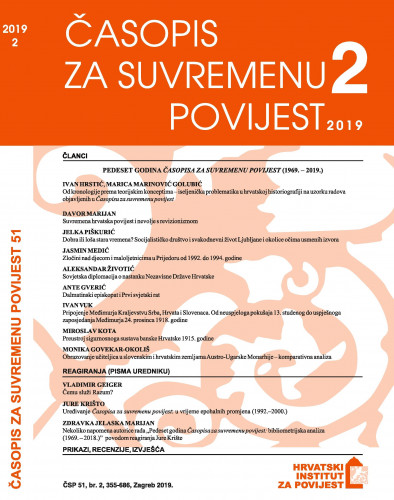Druge godine Velikoga rata preustrojava se sigurnosni sustav banske Hrvatske. Tom prilikom Središnja defenzivno doglasna služba, koja je obavljala poslove tajne državne policije, kao samostalno tijelo pri Zemaljskoj vladi postaje njezinom sastavnicom, ulazeći u sastav novoosnovanoga Odsjeka IV-B za pogranična redarstvena satništva Odjela za unutarnje poslove Zemaljske vlade. Razlozi preustroja, pored političkih, osobito sukoba vojnih i civilnih vlasti, bili su i raznovrsni funkcionalni. Zahvaljujući potrebama obrane Zemaljska vlada preko te službe počinje dobivati i dio financijskih podataka koji su joj do tada bili nedostupni jer su izlazili iz okvira autonomnih poslova banske Hrvatske. U članku se na temelju arhivskoga gradiva i relevantne historiografske literature te dijelom i tiska predstavlja i analizira preustroj sigurnosnoga sustava 1915. godine.; During the second year of the Great War, the state security system of Banal Croatia was restructured to include the Central Counterintelligence Service (SDDS), which had previously functioned as a secret police, as an independent body of the Land Government. The SDDS became part of the newly established Department IV-B, responsible for border patrol units, under the Land Government’s Internal Affairs Section. The reasons for this restructuring were of a political nature, specifically related to the conflict between military and civilian authorities, but also due to various functional reasons. Political reasons for the 1915 restructuring of Banal Croatia’s security system reflected the aspirations of both its Croatian civilian authorities and Hungary to gain greater control over the SDDS, as it was growing too familiar with the military authorities, which put the work of the Croat-Serb Coalition, and therefore the Hungarian dominance over Banal Croatia, in jeopardy. In fact, a majority of the Coalition’s distinguished members were illegally connected to the institutions that were unquestionably built on Greater Serbian ideals. The war itself was partially caused by Serbian aspirations to implement a Greater Serbian national-political programme. The Croatian civilian executive authorities not only avoided taking legal action against high treason, but also hesitated to bring the accused before the law for fear of losing the compromised Coalition. Instead, the civilian authorities would intervene in favour of the accused so as to prevent the crumbling of the Coalition, which was a guarantee to the regime that Banal Croatia would remain under Hungarian economic and political control, even if this endangered the entire Monarchy.
Sažetak

 Časopis za suvremenu povijest : 51,2(2019) / glavni i odgovorni urednik, editor-in-chief Zdravka Jelaska Marijan.
Časopis za suvremenu povijest : 51,2(2019) / glavni i odgovorni urednik, editor-in-chief Zdravka Jelaska Marijan.